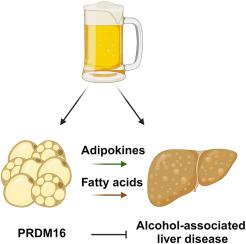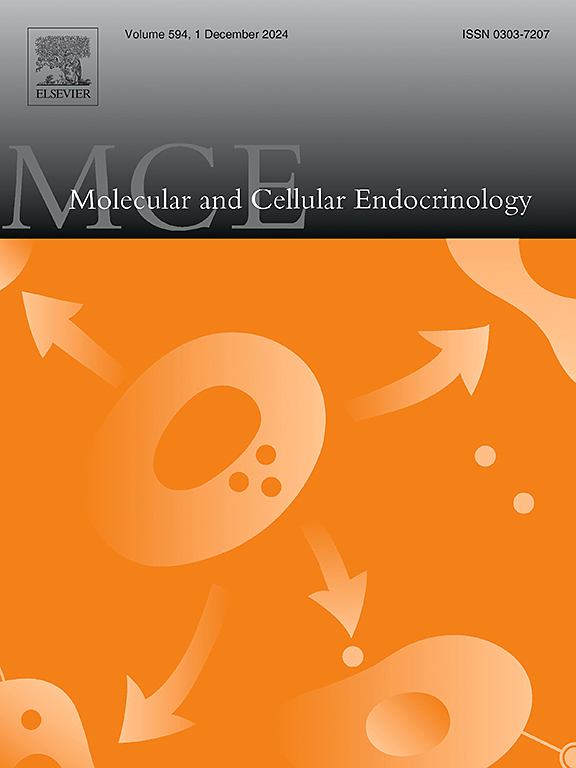发热脂肪细胞中的 PRDM16 介导器官间保护信号,防止酒精相关性肝病。
IF 3.8
3区 医学
Q2 CELL BIOLOGY
引用次数: 0
摘要
酒精相关性肝病(ALD)是主要的慢性肝病之一,尽管临床需求迫切,研究工作也十分广泛,但除了肝脏移植外,目前还没有针对ALD晚期的有效疗法。脂肪组织功能障碍与 ALD 的进展有关。此外,有研究表明,饮酒后可激活生热脂肪。在本研究中,即使小鼠在恒温饲养条件下接受酒精挑战,也能在其经典棕色脂肪组织和米色脂肪细胞中检测到生热基因表达的增加。特别是,在酒精挑战后的小鼠皮下脂肪中,观察到米色脂肪功能的关键转录辅成分 Prdm16 表达水平较高。本研究旨在探讨脂肪细胞 PRDM16 在 ALD 中的功能意义。尽管Prdm16脂肪细胞特异性缺失小鼠(Prdm16-adKO)在基础水平上没有表现出肝脏缺陷,但在两种不同的酒精挑战方案后,与对照组Prdm16fl/fl小鼠相比,Prdm16-adKO小鼠的ALD表型加剧了。机理研究表明,酒精滥用后的脂肪功能障碍,包括酒精诱导的脂肪分解活性、脂肪酸氧化和脂肪因子水平的变化,可能导致 Prdm16-adKO 小鼠的 ALD 表型恶化。这些结果表明,PRDM16介导的脂肪信号传导对酗酒引起的肝损伤具有保护作用,表明它可能是ALD的潜在治疗靶点。本文章由计算机程序翻译,如有差异,请以英文原文为准。

PRDM16 in thermogenic adipocytes mediates an inter-organ protective signaling against alcohol-associated liver disease
Alcohol-associated liver disease (ALD) is one of the major chronic liver diseases and despite the dire clinical needs and extensive research efforts, no effective therapies are available for late-stages of ALD except for liver transplantation. Adipose tissue dysfunction has been implicated in the progression of ALD. Furthermore, it has been previously suggested that thermogenic fat can be activated after alcohol consumption. In this study, increased thermogenic gene expression was detected in both classical brown adipose tissue and beige adipocytes in mice that were given alcohol challenges even when housed at thermoneutrality. In particular, higher expression level of Prdm16, the key transcriptional co-component for beige fat function, was observed in the subcutaneous fat of mice after alcohol challenges. The objective of the present study is to explore the functional significance of adipocyte PRDM16 in the context of ALD. Even though Prdm16 adipocyte-specific-deleted mice (Prdm16-adKO) did not show liver defects at the basal level, following two different alcohol challenge regimens, exacerbated ALD phenotypes were observed in Prdm16-adKO mice compared to that of the control Prdm16 fl/fl mice. Mechanistic investigation suggests that adipose dysfunction after alcohol abuse, including alcohol-induced changes in adipose lipolytic activity, fatty acid oxidation and adipokine levels, may render the worsened ALD phenotype in Prdm16-adKO mice. These results indicate PRDM16-mediated signaling in fat plays a protective role against liver injury caused by alcohol abuse, suggesting it may represent a potential therapeutic target against ALD.
求助全文
通过发布文献求助,成功后即可免费获取论文全文。
去求助
来源期刊

Molecular and Cellular Endocrinology
医学-内分泌学与代谢
CiteScore
9.00
自引率
2.40%
发文量
174
审稿时长
42 days
期刊介绍:
Molecular and Cellular Endocrinology was established in 1974 to meet the demand for integrated publication on all aspects related to the genetic and biochemical effects, synthesis and secretions of extracellular signals (hormones, neurotransmitters, etc.) and to the understanding of cellular regulatory mechanisms involved in hormonal control.
 求助内容:
求助内容: 应助结果提醒方式:
应助结果提醒方式:


